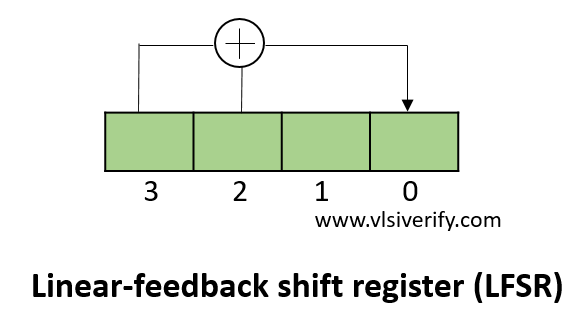Tutorials
Learn More
Linear Feedback Shift Register (LFSR)
A Linear-feedback shift register (LFSR) is another variation of shift register whose input bit is a linear function (typically XOR operation) of its previous state. It is generally used as a pseudo-random number generator, whitening sequence, pseudo-noise sequence, etc.
The bit positions that act as an input to a linear function to affect the next state are known as taps.
4-bit pseudo-random sequence generator

At every step,
- Q[3] xor Q[2]
- Q = Q << 1
- The result of the XOR operation is fed to the LSB (0th bit)
In the above pseudo-random sequence generator, taps are 4 and 3.
LFSR Verilog Code
module LFSR(input clk, rst, output reg [3:0] op);
always@(posedge clk) begin
if(rst) op <= 4'hf;
else op = {op[2:0],(op[3]^op[2])};
end
endmoduleTestbench Code
module TB;
reg clk, rst;
wire [3:0]op;
LFSR lfsr1(clk, rst, op);
initial begin
$monitor("op=%b",op);
clk = 0; rst = 1;
#5 rst = 0;
#50; $finish;
end
always #2 clk=~clk;
initial begin
$dumpfile("dump.vcd"); $dumpvars;
end
endmoduleOutput:
op=xxxx
op=1111
op=1110
op=1100
op=1000
op=0001
op=0010
op=0100
op=1001
op=0011
op=0110
op=1101
op=1010
op=0101
op=1011Verilog Codes